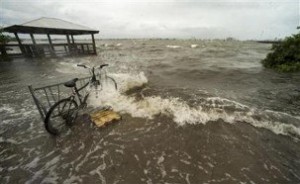
As I’m sure most of you know, Tropical Storm Andrea hit the coast of Florida on Thursday, June 6, 2013 north-northwest of Cedar Key, FL (http://local.msn.com/tropical-storm-andrea-landfall-florida?ocid=ansloc11 ). This was the first Atlantic Tropical Storm for 2013.
Note-this message was originally written last week, but was blocked by the UF SPAM system. As we are in the middle of the storm/hurricane season, I thought it still relevant.
As we enter the tropical storm season, please be reminded that plant diseases and insects can be spread by wind. Check out this UF-IFAS EDIS publication by Dewdney and Graham that cites wind as a means of spreading the bacterium causing citrus canker disease (http://edis.ifas.ufl.edu/cg040)
If you think you have detected a new invasive species due to wind or rain, remember the following-
1. Your local county extension service is your first line of communication for questions regarding management and detection (http://solutionsforyourlife.ufl.edu/map/index.html )
2. Local Florida county offices have access to our UF-IFAS DDIS (Distance Diagnostic and Information System) for submitting digital images of concern or unknown specimens (http://ddis.ifas.ufl.edu/)
3. Local Florida county offices and the general public can also utilize the services of our statewide Insect Identification Lab (http://entnemdept.ifas.ufl.edu/InsectID/index.html)
4. UF-IFAS has extensive Plant Disease Clinic extension services (http://plantpath.ifas.ufl.edu/clinic/, please note that sample processing fees may apply)
Have more information on the spread of invasive species through hurricanes or wind that you would like to share this storm season? E-mail me at achodges@ufl.edu to post it on UF-IFAS Pest Alert!
 0
0
